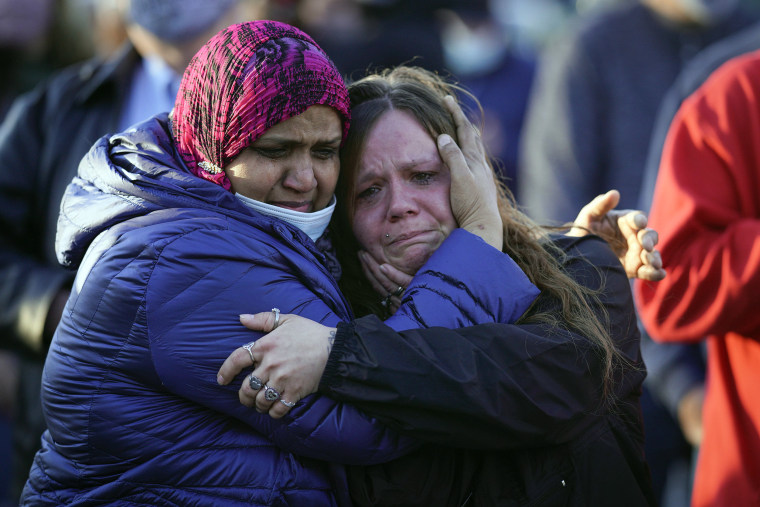Some experts believe a contagious effect sometimes seen after widely publicized suicides could be tied to back-to-back shootings over the weekend, which followed a handful of other high-profile shootings this year.
There have been at least seven mass shootings, defined as three or more people having been shot, this year, according to data collected by NBC News, with a fear of more to come as Covid-19 restrictions are lifted nationwide. Pandemic-related trauma and an increase in gun violence as firearm sales increased throughout last year have been serious concerns for reopening, said Jillian Peterson, an associate professor of criminology and criminal justice at Hamline University in St. Paul, Minnesota.
"We do know that those types of mass shootings are contagious, that they tend to spread through things like the media and social media," said Peterson, a co-founder of The Violence Project, a nonprofit research center. "That people who are maybe vulnerable see themselves in other perpetrators who do this, people who already have kind of their own history of trauma, who are maybe feeling suicidal, who are in crisis, who have access to weapons, they see one make national headlines, and there is this copycat effect."
Peterson's research has found that trauma, a need for validation, access to weapons and reaching a crisis point are common risk factors for mass shooters. Shooters need validation, Peterson said — at least one was reported to have checked social media to see whether they were trending during the act, which made the rest of the world an active participant in the shooting.
Shooters have become infamous for their violent crimes, their names and faces often shown on cable news and across social media for days after the acts. A 2015 study found that such coverage heightens the probability of similar incidents for an average of 13 days after an event.
"I think I'm seeing less of that now, that people realize that is the contagion effect, right? When you make these individuals famous, that's what other people are looking for," Peterson said. "They're looking for that notoriety. They want to be a household name, just like the perpetrator that came before them."
Gun violence didn't take a break during the coronavirus pandemic — firearm deaths increased by 25 percent last year, according to the Gun Violence Archive, a nonprofit project cataloging gun violence.
Data about mass shootings vary because researchers often use different definitions, but general gun death data from the Centers for Disease Control and Prevention found that more than half of firearm deaths are suicide-related.
To separate mass shooting prevention from suicide prevention is a mistake, said Joel Dvoskin, a clinical and forensic psychologist with more than 40 years' experience in the field. Mass shootings often happen when despair meets rage, which hasn't been in short supply recently, he said.
"If you think about it, whenever somebody decides to kill a bunch of people, they're deciding to end their life as they know it," Dvoskin said. "Nobody goes back to their job. Nobody goes back to their family. Either they kill themselves or they make sure that the police kill them or they go away for the rest of their life to either prison or a hospital."
Although it has often been convenient to label shooters as mentally ill, there are no data to support the idea that those with severe diagnosed mental illness are any more likely to commit acts of mass violence, Dvoskin said. But that doesn't mean those crimes aren't connected to emotional crises that can be triggered as people see acts of violence around them.
"It had the effect of, say, 'Well, I want to go out with a bang,'" Dvoskin said. "'I want to be famous. ... People haven't paid attention to me. They haven't listened to me. They haven't considered me. Well, they're going to pay attention to me now, by God.' And the cable news is all too happy to oblige them."
While some have said the contagion theory is a significant factor in clusters of mass gun violence, Dr. Jonathan Metzl hesitated to put too much emphasis on individual motives. Gun violence prevention should look at the larger context of environmental factors that drive shootings, said Metzl, the director of medicine, health and society at Vanderbilt University in Nashville, Tennessee.
"It's not just that we overlook particular shootings because of the racial politics of our country — that's true — but it's also that doing it that way really limits the scope of how we can imagine different ... policy solutions," Metzl said. "So I just think that there needs to be much more common ground and common cause in terms of that research, policy, intervention, alliance."
It's possible that shooters are responding to other events, but it's equally possible that clusters occur because potential shooters are responding to the environment and the mood. The U.S. is in a "vicious and self-perpetuating cycle" of anger, fear and distrust of one another amid a range of conditions that have created feelings of despair as the country reopens, Metzl said.
That has happened as Americans have been buying more firearms: Gun sales spiked as Americans expressed fear of civil unrest over the pandemic and the election.
"It was really a perfect storm. I mean, the pandemic really was a kind of gun trauma superspreader in so many ways, because of all these things happening, and it's something we're going to be dealing with for quite some time," Metzl said. "I think what we're seeing now is just the beginning."
If you or someone you know is in crisis, call the National Suicide Prevention Lifeline at 800-273-8255, text HOME to 741741 or visit SpeakingOfSuicide.com/resources for additional resources.
